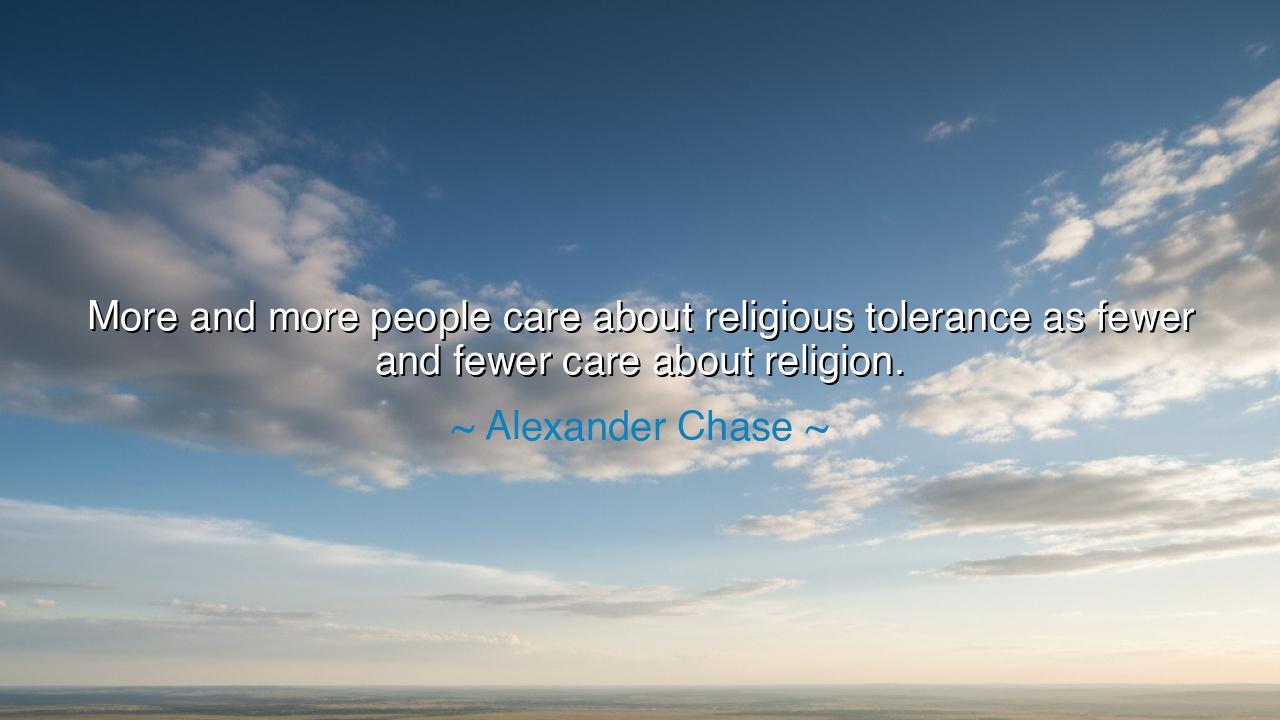
More and more people care about religious tolerance as fewer and
More and more people care about religious tolerance as fewer and fewer care about religion.






“More and more people care about religious tolerance as fewer and fewer care about religion.” Thus spoke Alexander Chase, the essayist and thinker whose words pierce through the illusions of the modern age. In this subtle yet powerful observation, he reveals a paradox of civilization — that as devotion fades, tolerance grows, but it is a hollow tolerance, born not of understanding, but of indifference. His words are not an attack upon tolerance, but a lament that its rise may come not from enlightenment, but from apathy. For true tolerance, as the ancients knew, is not the absence of conviction, but the presence of compassion — and compassion without faith in something greater soon withers like a flower without root.
In the age of Chase, the twentieth century, the fires of faith were dimming in many hearts. Science had unveiled the secrets of matter; technology had conquered the skies. The gods of industry and reason had replaced the old altars. Yet amid this turning away from religion, society began to speak fervently of tolerance — of coexistence, of respect among beliefs. And indeed, this was noble, for humanity had long suffered under the cruelty of fanaticism. But Chase’s insight warns of a quiet danger: that in fleeing from dogma, we may lose devotion itself — that in our eagerness to avoid conflict, we may forget the deeper truths that once gave us meaning.
When faith was strong, men fought bitterly over its shape, yet they also lived and died for what they believed. Their prayers rose from the depth of the soul, their virtues rooted in sacred duty. But as faith weakened, men no longer cared enough to argue. They learned to tolerate one another not because they understood one another, but because belief itself had ceased to matter. Thus, tolerance without reverence becomes a shadow virtue — polite, but empty. It allows peace to reign on the surface while the heart grows cold beneath.
Consider the decline of ancient Rome, whose early citizens honored their gods with zeal and sacrifice. As their empire expanded, they grew tolerant — not from spiritual wisdom, but from weariness. All gods were welcomed, but none were worshipped. The temples stood open, but the prayers within them were hollow. Rome’s tolerance was vast, but it was not rooted in faith — and so, when the storms came, there was no soul strong enough to withstand them. Chase’s words echo this history: that a people who forget the sacred soon lose even the meaning of their tolerance, for it becomes mere disinterest rather than mercy.
This is not to say that tolerance is wrong — far from it. True tolerance is one of the highest fruits of wisdom. It is the understanding that love is greater than creed, that truth wears many garments. But it must be built upon spiritual depth, not emptiness. When one’s faith is secure, one has no need to destroy another’s; when one’s love of God is true, it cannot breed hatred. The saints of all ages — from the gentle Francis of Assisi to the radiant Rumi — lived this truth. They did not tolerate others out of apathy, but out of overflowing compassion. Their hearts were anchored in the Divine, and from that depth they embraced all humanity.
Chase’s wisdom, therefore, is not a condemnation but a call to balance — that we should not trade the sacred for the comfortable. The modern world may praise tolerance, but it must also reclaim reverence. To care about tolerance is good; to care about truth is better. For only when both dwell together — conviction and compassion, faith and freedom — can the human spirit flourish. A society that tolerates without believing will soon forget why it should care at all.
So, O seekers of wisdom, learn from this paradox: do not let tolerance become the mask of emptiness. Let it instead be the fragrance of faith — faith not in dogma, but in the sacred worth of every soul. Believe in something larger than yourself, something that gives shape to your mercy and fire to your love. Engage with others not as strangers to be tolerated, but as brothers and sisters to be understood.
For in the end, as Alexander Chase teaches, the world does not need more indifference disguised as peace. It needs hearts alive with both belief and benevolence — souls that love deeply, think freely, and serve humbly. Only then can tolerance rise from mere coexistence to sacred communion. For when love and faith walk hand in hand, then — and only then — can humanity truly call itself enlightened.






AAdministratorAdministrator
Welcome, honored guests. Please leave a comment, we will respond soon